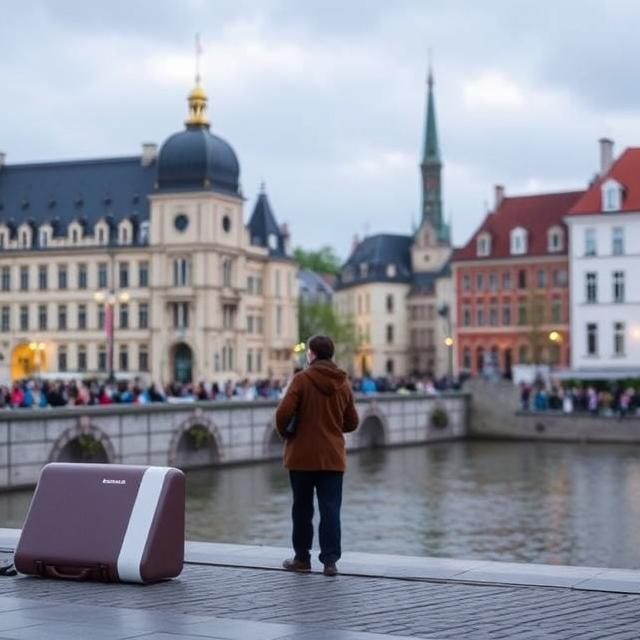Traveling the world on a budget is entirely possible with the right strategies and mindset. Whether you’re looking for cheap flights, affordable accommodations, or ways to make your trip last longer, there are plenty of ways to save money while still experiencing incredible destinations. Here are the top tips for traveling the world on a budget:
1. Be Flexible with Your Travel Dates
- Fly During Off-Peak Seasons: Airfares are often cheaper during the shoulder seasons (early spring or fall) or off-peak months, when there’s less demand for flights.
- Use Flexible Date Search: Use flight comparison tools like Skyscanner or Google Flights to explore the cheapest days to fly. Being flexible with your departure and return dates can save you significant amounts.
- Book in Advance: While last-minute deals can occasionally pop up, booking flights several months ahead typically guarantees lower fares.
2. Consider Alternative Airports
- Look for Smaller Airports: Major international airports often have higher fees and taxes. Search for alternative airports near your destination. For example, flying into Berlin Schönefeld instead of Berlin Tegel or London Luton instead of London Heathrow can save you money.
- Be Ready for Extra Transportation: If you fly into a secondary airport, ensure that the cost of transport to your accommodation or city center doesn’t negate the savings.
3. Use Budget Airlines
- Explore Low-Cost Carriers: Many regions have low-cost airlines that offer significant savings over major carriers. Examples include Ryanair, EasyJet (Europe), AirAsia (Asia), and Southwest Airlines (USA).
- Watch for Hidden Fees: Budget airlines may offer cheap base fares, but be mindful of additional fees for things like checked baggage, seat selection, and meals.
4. Stay in Budget Accommodations
- Hostels and Guesthouses: Hostels are a great way to save money and meet other travelers. Websites like Hostelworld and Booking.com allow you to find affordable, safe, and social places to stay.
- Couchsurfing: Use Couchsurfing to stay with locals for free. This not only saves you money but also allows you to experience a destination through the eyes of the locals.
- Airbnb: Renting a room in someone’s home through Airbnb can be cheaper than hotels and offer a more authentic experience.
- Work for Accommodation: Consider platforms like Workaway, HelpX, or WWOOF, where you can exchange a few hours of work per day for free accommodation and meals.
5. Travel Slowly
- Stay Longer in Each Place: Traveling slowly reduces your overall travel costs, as you save on transportation between destinations. Long stays also give you time to explore the local culture and take advantage of discounts for long-term accommodation.
- Slow Travel Benefits: Many countries, especially in Southeast Asia or Eastern Europe, offer significant discounts for monthly rentals, making slow travel both more affordable and immersive.
6. Eat Like a Local
- Street Food: Eating at local food stalls or markets is often much cheaper and tastier than dining in touristy restaurants. Street food is not only affordable but also provides an authentic cultural experience.
- Grocery Stores and Cooking: If you’re staying in an Airbnb or hostel with kitchen facilities, shop at local grocery stores and markets and cook your own meals. Cooking can save a lot of money, especially in places where restaurant prices can be inflated for tourists.
- Avoid Tourist Areas: Restaurants in popular tourist spots are often overpriced. Walk a few blocks away from major attractions to find more affordable options where locals eat.
7. Use Public Transportation
- Trains, Buses, and Subways: Public transportation is usually the cheapest way to get around a city or country. Many cities have affordable metro systems or bus networks, and even intercity trains and buses can offer great value.
- Travel Passes: Some cities offer travel cards that provide unlimited use of public transport for a fixed number of days, which can be a cost-effective option if you plan to explore the city extensively.
- Bike Rentals: Many cities have bike-sharing programs, which offer a low-cost, eco-friendly way to get around. Look for options like Citi Bike (New York), Santander Cycles (London), or Lime and Spin for affordable city cycling.
8. Use Reward Points and Travel Hacks
- Sign Up for Travel Rewards Credit Cards: Many credit cards offer travel points or miles as part of their rewards programs, which can be used to reduce the cost of flights, hotels, and car rentals. Choose cards that offer significant sign-up bonuses and good points accumulation rates for everyday purchases.
- Frequent Flyer Miles: If you frequently travel, consider signing up for airline loyalty programs to accumulate miles that can later be redeemed for free or discounted flights.
- Use Points for Accommodation: Some hotel loyalty programs, like Marriott Bonvoy or Hilton Honors, allow you to use points to book free nights at their properties.
9. Find Free Activities
- Walking Tours: Many cities offer free walking tours where guides show you around popular attractions and hidden gems. While the tours are free, it’s customary to tip the guide at the end.
- Outdoor Adventures: Hiking, swimming, or exploring public parks and beaches are typically free activities that allow you to connect with nature without spending money.
- Museums and Galleries: Look for museums with free entry or those that offer discounted admission on specific days of the week or month.
- Festivals and Local Events: Many local festivals and events are free to attend. Check local event listings or tourism boards to find free cultural experiences happening during your stay.
10. Pack Light
- Avoid Extra Baggage Fees: Many budget airlines charge high fees for checked luggage. Stick to carry-on luggage to save on fees and avoid unnecessary weight. By packing light, you can also move around more freely and avoid additional charges.
- Pack Essentials: Make sure you pack only what you really need to avoid purchasing items on the go. Essentials include clothing for various weather conditions, toiletries in travel-sized containers, and any medications you might need.
11. Choose Affordable Destinations
- Travel to Less Expensive Countries: Some countries are naturally cheaper to visit than others. Southeast Asia, Eastern Europe, and Central America, for example, offer great value for money when it comes to accommodation, food, and activities.
- Travel in Countries with Favorable Exchange Rates: Pay attention to the exchange rates of the countries you visit. Countries with weaker currencies compared to your home currency will make your money go further. For example, countries like Vietnam, Mexico, and Turkey are known for being affordable.
12. Use Local Sim Cards or Wi-Fi
- Avoid Roaming Fees: Instead of relying on expensive roaming charges for your phone, buy a local SIM card with data or use free Wi-Fi available in cafes, restaurants, and public spaces.
- Apps for Budget Travelers: Download apps like Maps.me (offline maps), Google Translate, and XE Currency to help you navigate and save money without needing to purchase international data plans.
13. Travel Insurance
- Shop Around for the Best Deals: While travel insurance is essential, it doesn’t have to be expensive. Compare different providers to find a policy that offers the best value for your needs. Websites like World Nomads or SafetyWing specialize in budget-friendly insurance options for travelers.
14. Take Advantage of Special Deals and Discounts
- Groupon and Deal Websites: Websites like Groupon or LivingSocial often offer travel discounts, including discounted tours, excursions, and activities.
- Student and Youth Discounts: If you’re a student or under a certain age, look for discounts through platforms like ISIC (International Student Identity Card) or STA Travel. These can provide discounts on flights, accommodation, transportation, and attractions.
- Travel Deals Newsletters: Sign up for travel deal newsletters from sites like Secret Flying or The Flight Deal, which often share flight error fares or last-minute sales for budget-conscious travelers.





